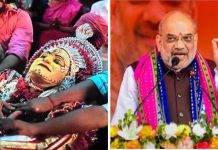
Emphasizing Hindi all over the country, the Home Minister of India said “Now the time has come to make the Official Language an important part of the unity of the country.”
An alternative to English
Union home minister Amit Shah on Thursday said Hindi should be adopted as an alternative to English in Indian states. He added that while it should not replace local languages, states using Hindi would act as a unifier.
In the 37th meeting of the Parliamentary Official Language Committee, Shah wanted to bring the importance of Hindi.

“Prime Minister Narendra Modi has decided that the medium of running the government is the Official Language, and this will increase the importance of Hindi. Now the time has come to make the Official Language an important part of the unity of the country. When citizens of States who speak other languages communicate with each other, it should be in the language of India,” Shah said.
The home minister said when citizens of states, who speak different languages, communicate with each other, it should be in “the language of India”, the statement said.
Hindi should be more flexible
Amit Shah explained that Hindi should be accepted as an alternative to English and not the local language. He also advised that Hindi should be made more flexible by accepting words from other local languages.
The Home Minister emphasized the need to give elementary knowledge of Hindi to students up to Class IX and pay more attention to Hindi teaching examinations.
Shah informed that 70 percent of the agenda of the Cabinet is now prepared in Hindi. He said 22,000 Hindi teachers have been recruited in the eight states of the Northeast, and nine tribal communities of the region have converted scripts of their dialects to Devanagari.
All these states have also agreed to make Hindi compulsory in schools up to Class X, he said.

Shah has always pushed for greater use of Hindi by officials and the youth and has said that India’s culture and value systems had remained protected primarily because of the language.


































